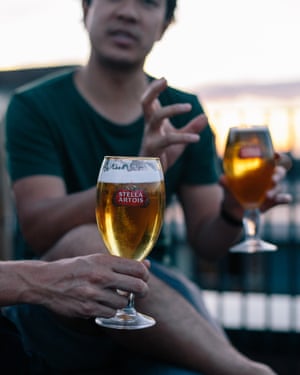“I’ve definitely lost contact with groups of friends,” says Jonny Wong. “In London especially, it’s harder to meet up with friends. It’s just a lot of effort, and the older you get, the more you value your time.”
“That’s it,” agrees Olly Honess. “There’s only so much energy, and so many hours in the week. At the age of 30, 35, people are starting to settle down, too.”
Wong and Honess, who are 34 and 35 years old respectively, are talking to me on Zoom about their friendship – and, as it turns out, they’re not the only ones experiencing a decline in numbers on the friendometer. According to research by the Jo Cox commission, men start to lose friends once they hit 30, and 35 is when men reach “peak loneliness”.
Human beings feel pressure to wear a mask of success, Raul Aparici, faculty lead at The School of Life, tells me. We are compelled to show that we are, well, winning at life.
“But on the inside,” he says, “we all share the existential things that come with being a human: we’re all vulnerable, we have fears, we struggle with shame and the way we see ourselves.” If we think we’re the only ones struggling with these intrinsically human qualities, then we’re “suffering unnecessarily”, he believes.
The way to stop yourself haemorrhaging friends, then, is to have the guts to show what you’re feeling inside, on the outside. “When we become vulnerable and allow others to see us as we are, they can also recognise their vulnerability in us,” says Aparici. “We can all just become comfortable with who we are.”

-
Wong and Honess in their student days
For Wong and Honess, making time for each other and personal conversations is what kept their friendship strong since they first met as students in Manchester. That, and having a laugh. They bonded initially over a shared sense of humour and a love of photography.
After university, they both moved to London. Wong ended up moving into the flat Honess shared with his girlfriend (“I don’t think they anticipated how much a part of their relationship I would become,” he jokes). When Honess saw Wong unpacking an old primary school tea towel, he realised a “particularly bad” drawing by a “Jonathan W” that he’d constantly mocked as a boy visiting his grandmother’s was, in actual fact, done by one of his best friends. (His grandmother was a governor of Wong’s old primary school.) “I couldn’t believe it,” laughs Honess. “Our whole lives I’d been laughing at his picture.”
Being flatmates, Wong says, means you go through more together. When he eloped just recently, the only non-family invited was Honess and his fiancé, and the bride’s bridesmaid. He and his wife shared vows they would never have said to a full wedding party, which made the occasion infinitely more intimate.
“Men don’t really talk about each other’s lives so much – especially in groups,” says Honess. “It’s more of a game of one-upmanship, which is great fun. But if I meet Jonny one-on-one for a pint, we’re much more likely to discuss how things are going personally.”



-
‘We took it for granted when we saw each other all the time,’ says Wong, ‘so we started making much more effort to see each other – and valuing that time’
He values Wong’s advice, and feels listened to when he does open up. And there clearly is reciprocation; Wong recently asked Honess for some advice on a professional dilemma he was chewing over, putting trust in his friend’s people skills.
Growing older, however, means changing priorities. Whether it’s because of partners, children or relocation, friendships just naturally fall by the wayside. “By the time you realise they’re gone,” says Aparici, “something has changed between you, and it’s harder to reconnect.”
Eventually, Wong moved into a flat with his now-wife. They had a baby over a year ago. “We took it for granted when we saw each other all the time,” he says of Honess, “so we started making much more effort to see each other – and valuing that time.”
Making that effort, for Aparici, is the first step to not only maintaining those friendships that matter, but developing new ones, too. “Decide it’s important,” he says. “It’s like getting a partner, or a job. If you’re serious, you’ve got to put yourself out there. Phone conversations are good if you’re geographically apart. Make dedicated time in your diary for your friends.”
Aparici tells me any “rituals you can build around sociability” can help you maintain your friendships. This is something Wong and Honess have done organically, meeting around twice a month for dinner on Sunday, or for drinks after work – with daily messages pinging back and forth on WhatsApp.

“I think we can get better at spotting opportunities where we can ask more probing questions – and make it OK for difficult things to be discussed, without judgment,” Aparici adds. Vulnerability, he believes, is a skill to be worked at, like going to the gym – one visit doesn’t mean you’ll be fit for life. We need to understand that we all want to be vulnerable, but sometimes it’s just not reciprocated – and that’s OK.
“Friendships can help us be the best selves we can be – they can help us realise our potential,” says Aparici. “Our internal voices are normally punitive, and our friends are the ones who can judge us more fairly – they can be a supportive voice. They can make us feel content and fulfilled, that we’ve impacted their lives and they’ve impacted ours.
“But a lot of the time we’re too scared to ask the deeper questions, afraid we might not be able to deal with it if they tell us something difficult,” he says. “There’s really no reason to be scared. It’s just part of being human.”
Take the time to savour the special moments with your loved ones with a chalice of Stella Artois

Please drink Stella Artois responsibly. For the facts, visit drinkaware.co.uk
from Lifestyle | The Guardian https://ift.tt/2Sezchd
via IFTTT

comment 0 Comment
more_vert